教学课件 --冀教版中学英语七年级(下) UNIT4 Lesson19
文档属性
| 名称 | 教学课件 --冀教版中学英语七年级(下) UNIT4 Lesson19 | 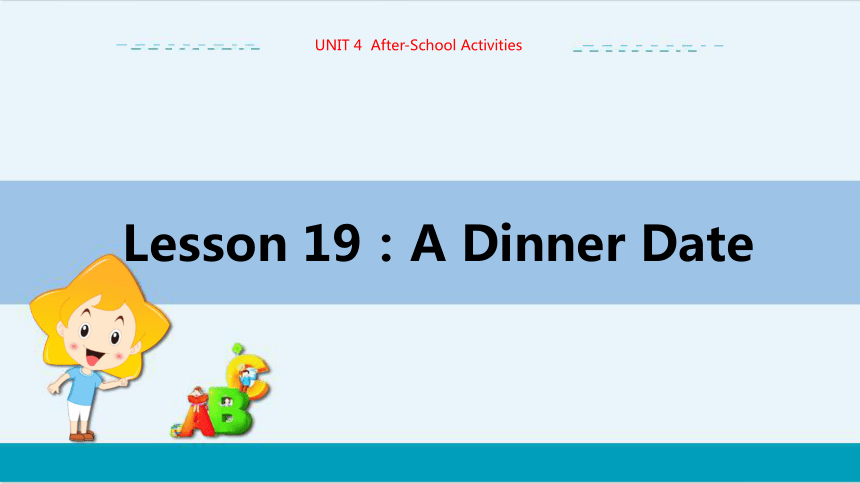 | |
| 格式 | pptx | ||
| 文件大小 | 1.9MB | ||
| 资源类型 | 试卷 | ||
| 版本资源 | 冀教版 | ||
| 科目 | 英语 | ||
| 更新时间 | 2024-02-21 19:48:13 | ||
图片预览

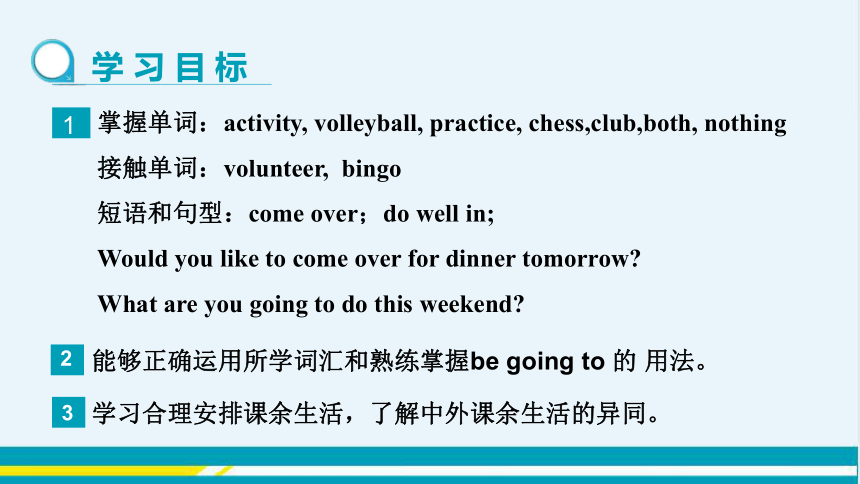

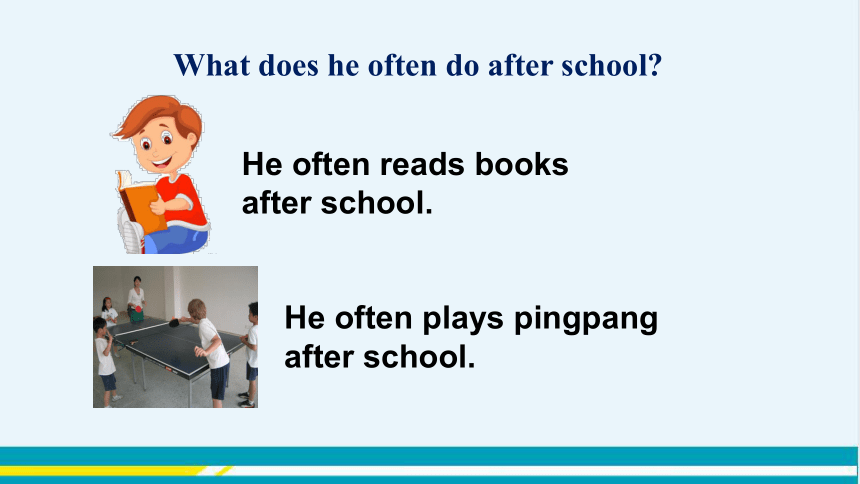
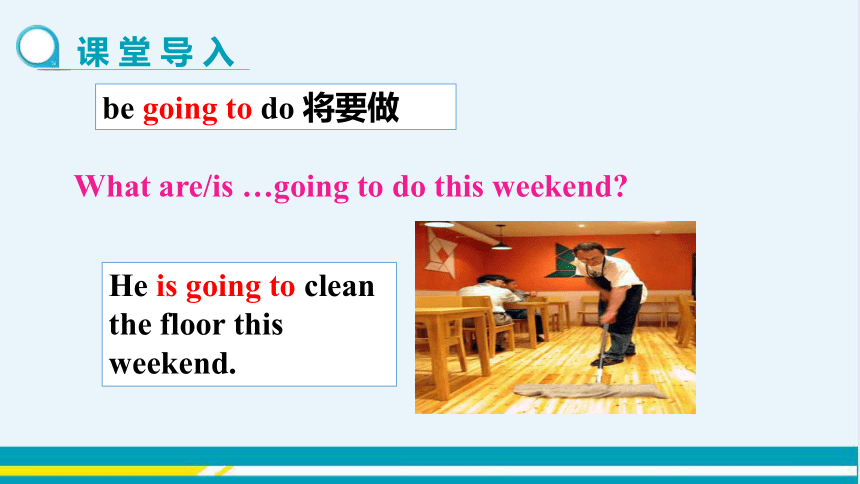
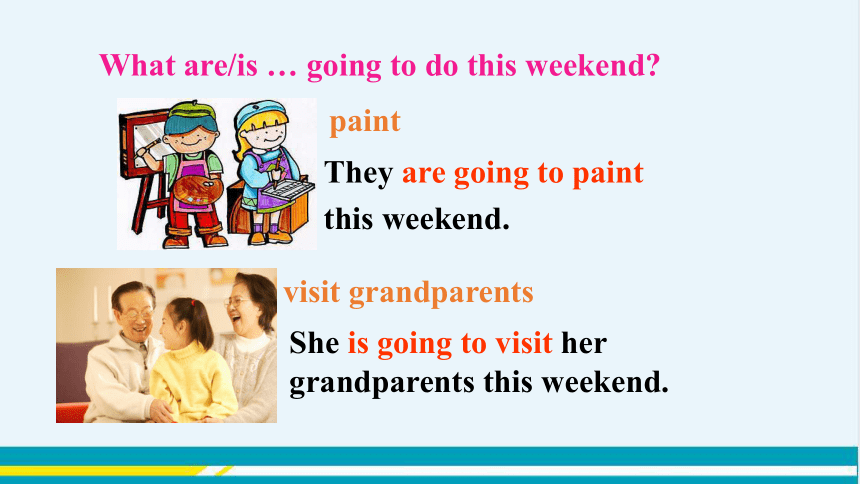
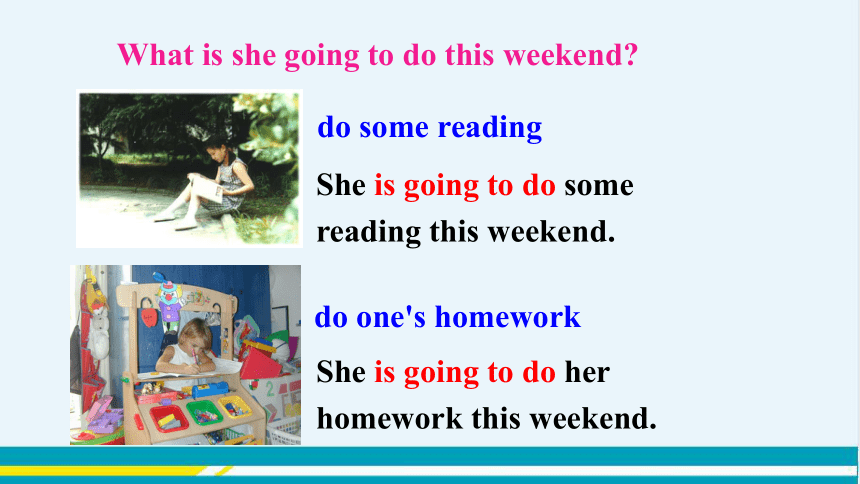
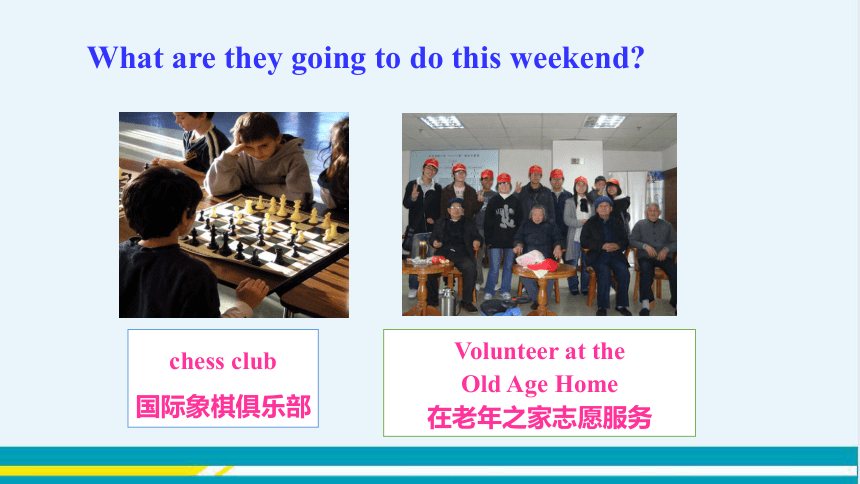
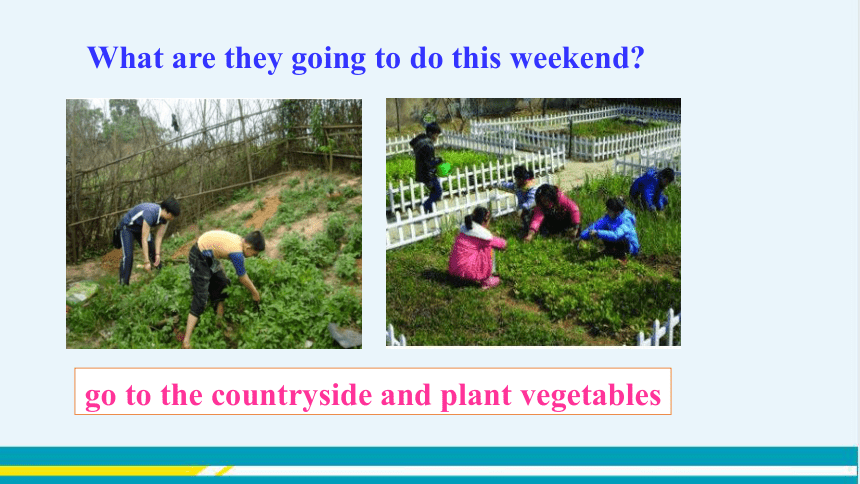
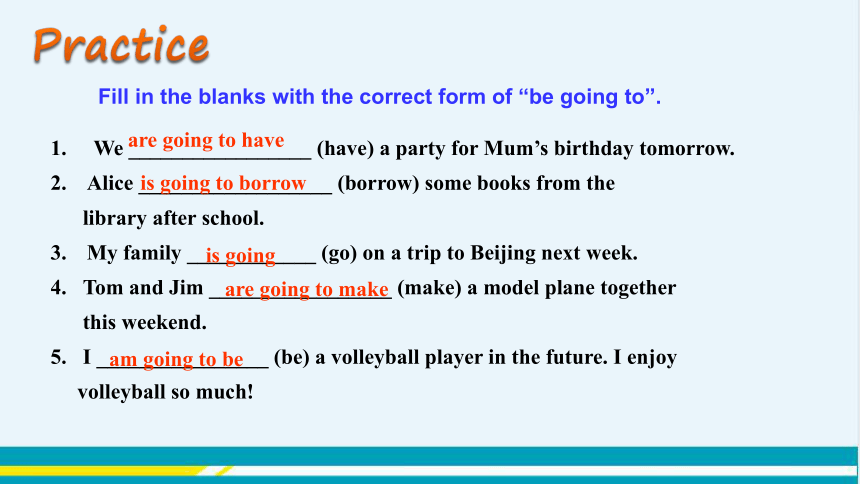
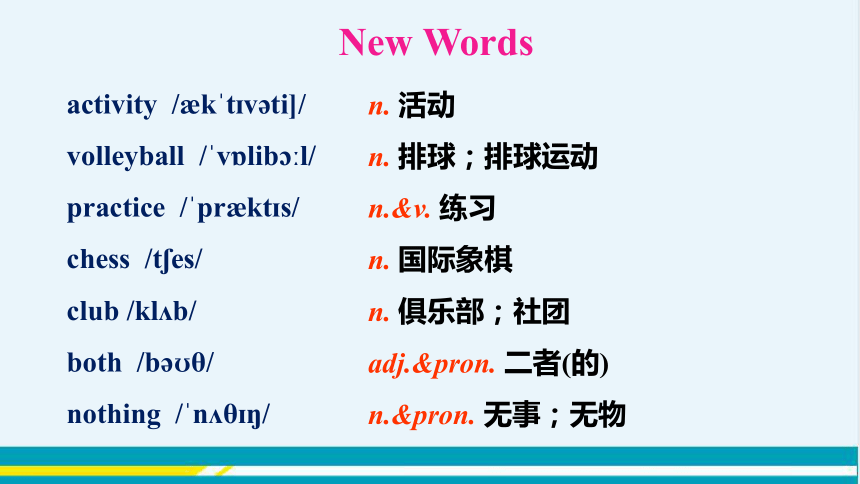
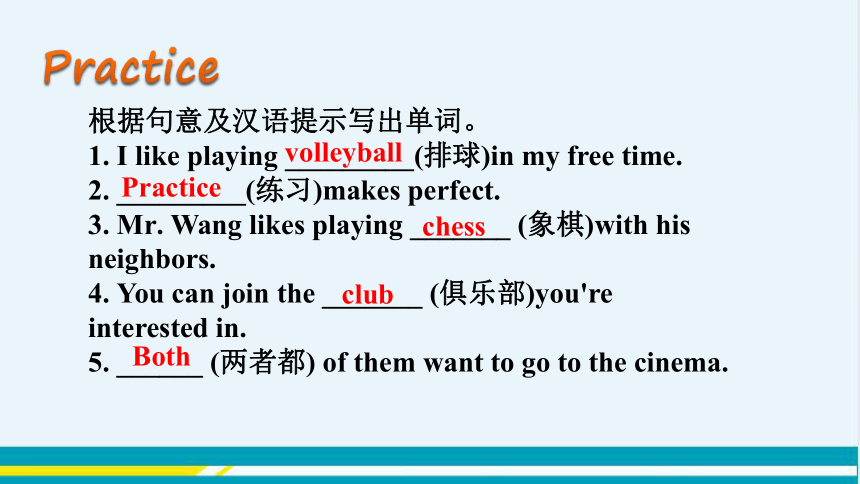
文档简介
(共31张PPT)
Lesson 19:A Dinner Date
UNIT 4 After-School Activities
学 习 目 标
掌握单词:activity, volleyball, practice, chess,club,both, nothing
接触单词:volunteer, bingo
短语和句型:come over;do well in;
Would you like to come over for dinner tomorrow
What are you going to do this weekend
1
3
学习合理安排课余生活,了解中外课余生活的异同。
能够正确运用所学词汇和熟练掌握be going to 的 用法。
2
Lead in
Let’s talk about some after-school activities.
课 堂 导 入
What does he often do after school
He often reads books after school.
He often plays pingpang after school.
He is going to clean the floor this weekend.
What are/is …going to do this weekend
课 堂 导 入
be going to do 将要做
What are/is … going to do this weekend
paint
She is going to visit her grandparents this weekend.
visit grandparents
They are going to paint this weekend.
What is she going to do this weekend
She is going to do her homework this weekend.
She is going to do some reading this weekend.
do one's homework
do some reading
chess club
国际象棋俱乐部
Volunteer at the
Old Age Home
在老年之家志愿服务
What are they going to do this weekend
go to the countryside and plant vegetables
What are they going to do this weekend
We _________________ (have) a party for Mum’s birthday tomorrow.
Alice __________________ (borrow) some books from the
library after school.
My family ____________ (go) on a trip to Beijing next week.
Tom and Jim _________________ (make) a model plane together
this weekend.
I ________________ (be) a volleyball player in the future. I enjoy
volleyball so much!
are going to have
is going
is going to borrow
Fill in the blanks with the correct form of “be going to”.
Practice
are going to make
am going to be
activity / k t v ti]/
volleyball / v lib l/
practice / pr kt s/
chess /t es/
club /kl b/
both /b θ/
nothing / n θ /
n. 活动
n. 排球;排球运动
n.&v. 练习
n. 国际象棋
n. 俱乐部;社团
adj.&pron. 二者(的)
n.&pron. 无事;无物
New Words
根据句意及汉语提示写出单词。
1. I like playing _________(排球)in my free time.
2. _________(练习)makes perfect.
3. Mr. Wang likes playing _______ (象棋)with his neighbors.
4. You can join the _______ (俱乐部)you're interested in.
5. ______ (两者都) of them want to go to the cinema.
Practice
volleyball
Practice
chess
club
Both
What is Jim going to do this week
Listen and tick the pictures.
Listen
1. What is Steven’s schedule for tomorrow
2. What’s Jim’s schedule for Wednesday
3. What’s Steven’s schedule for Thursday
He usually volunteers at the Old Age Home on Thursdays.
He is going to the chess club after school.
He has volleyball practice tomorrow.
Read the conversation and answer the questions.
Reading
4. What’s Steven’s schedule for Friday
5. What is Jim going to do this weekend
6. What is Steven going to do this evening
He is going to the countryside with his dad.
They are going to plant trees.
He has math classes on Fridays.
He is going to have dinner with Jim.
What is Steven going to do Read the lesson and write down his schedule for the week.
Monday
Tuesday
Wednesday
Thursday
Friday
Saturday
Sunday
volleyball practice
volunteer at the Old Age Home
math classes
have dinner with Jim
Read
What are you going to do after school this week Make up a dialogue.
Example:
A: What are you going to do after school on Wednesday
B: I’m going to see a movie with my friends. What are you going to do on…
A: I’m going to …
Work in pairs
A:What are you going to do after school on Wednesday
B:I am going to see a movie with my friends.
What are you going to do on Thursday
A:I am going to play football with my brother.
What are you going to do on Friday
B:I am going to have math classes.
An Example
1. We learned some useful words and phrases.
2. We learned “be going to” structure.
Sum up
Language points
1. What day is it today?今天是星期几?
这个句子主要用来询问星期几。回答时,要用 “It is ... today.”或“Today is...”
【注意】表示“星期几”的单词首字母都要大写。例:—What day is it today?今天星期几?
—It's Friday. 星期五。
2. Would you like to come over for dinner tomorrow?
明天你愿意过来吃完饭吗?
(1)“Would you like...?”中的like后面常接名词、代词和动词不定式,表示“你想要……吗?” 它与 “Do you want...?” 意思相近,但前者语气更委婉,用来礼貌地提出请求、征求对方的意见或委婉地提出建议。
例:—Would you like to meet Emily and Carol
你想见见艾米丽和卡罗尔吗?
—Of course.I hear they are twins and play the piano well.
当然。我听说她们是双胞胎,而且很会弹钢琴。
【拓展】① “Would you want...?”的肯定回答常用Yes,please.或 Yes,I would love/like to. 。否定回答常用No,thanks.
②“Do you want...?”的肯定回答用:Yes,I do. 否定回答用:No,I don't.
(2) come over是动词短语,意为“过来,顺便来访”。其后可接for sth.表示“过来做某事”;接“to+地点名词”表示“到某地来”。
例:Please come over to my house and have a nice dinner with us tonight. 今晚请到我家来, 并吃一顿不错的晚餐。
3. I have volleyball practice tomorrow.明天我有排球练习。
(1 )volleyball是名词,意为“排球”。当其与动词play搭配使用时,volleyball前面不能加定冠词the。
注意:所有球类运动名词与play连用时,都不加定冠词the。
例:It is fun to play volleyball. 打排球很好玩。
(2)practice是不可数名词,意为“练习”,强调经常性或系统性的重复练习。
例:How much piano practice do you have this week?
这一周你有多少钢琴练习?
4. How about Wednesday?星期三怎么样?
“How about...?”这个句型常用来询问消息、征求意见或者建议,其后跟名词、代词或动名词。
它相当于:What about...?
例:How/What about this red scarf?这条红围巾如何?
【拓展】用于询问意见/建议的句型还有:
① What do you think of… ② What's your opinion\suggestion
③ Shall we...? ④ Let's do sth.
5. Wednesday is not good for me.星期三对于我不合适。
be good for 意为 “对……合适,对……有益”。
其中good是形容词,意为“合适的”,for意为“对于”。其反义短语为:be bad for对……不利; 对……有害。
例:Vegetables is good for your health,but junk food is bad for your health. 蔬菜对你的健康有好处,但是垃圾食品对你的健康有害。
【学以致用】翻译句子。
吃太多盐对我们的健康不利。(no good for)
________________________________________
Eating too much salt is no good for our health.
6. I usually volunteer at the Old Age Home on Thursdays.
星期四我通常在敬老院自愿帮助老人。
volunteer 作动词,意为“自愿帮助; 做志愿工作 ”。
常用短语:volunteer to do sth. 自愿做某事。
例:Do you volunteer to help others?你能自愿帮助其他人吗?
【拓展】volunteer 还可以作可数名词,意为“志愿者”。例:Volunteers from different backgrounds is like part of one big family. 来自不同背景的志愿者感觉就像是一个大家庭中的一部分。
7. We're both busy all week.我们两个整个星期都很忙碌。
辨析: both与 all
8. Nothing!没有事!
nothing 是不定代词,意为 “没事,没什么,无物”。其用法有以下几点:
①当其作主语时,谓语动词要用单数形式。
如:Nothing is more important than health.没有什么比健康更重要。②当它被形容词修饰时,形容词要放在它的后面。
③当询问“打算做某事”时,如果没有什么安排,则可以用“Nothing!”作答;
例:—Do you have anything to do?你有什么事要做吗?
—Nothing!没事!
1.My parents _____ like Beijing Opera.
A.all B.both C.every D.each
2.There is ______ in the fridge. Let’s go to buy some.
A.anything B.something C.nothing D.everything
3.—We don’t have much homework this weekend. Can we go out together
—OK. What about ______ a movie
A.to watch B.watching C.watch D.watches
4. —Would you like to play football with me
—___________.
A.No, I don’t want to B.Yes, I’d love to C. Yes, I would D.Yes, please
课 堂 达 标
单项选择
1. Write a short passage to describe your after-school activities.
2. What are you going to do after school this week Make up a dialogue with your classmates.
Homework
Thank you !
Lesson 19:A Dinner Date
UNIT 4 After-School Activities
学 习 目 标
掌握单词:activity, volleyball, practice, chess,club,both, nothing
接触单词:volunteer, bingo
短语和句型:come over;do well in;
Would you like to come over for dinner tomorrow
What are you going to do this weekend
1
3
学习合理安排课余生活,了解中外课余生活的异同。
能够正确运用所学词汇和熟练掌握be going to 的 用法。
2
Lead in
Let’s talk about some after-school activities.
课 堂 导 入
What does he often do after school
He often reads books after school.
He often plays pingpang after school.
He is going to clean the floor this weekend.
What are/is …going to do this weekend
课 堂 导 入
be going to do 将要做
What are/is … going to do this weekend
paint
She is going to visit her grandparents this weekend.
visit grandparents
They are going to paint this weekend.
What is she going to do this weekend
She is going to do her homework this weekend.
She is going to do some reading this weekend.
do one's homework
do some reading
chess club
国际象棋俱乐部
Volunteer at the
Old Age Home
在老年之家志愿服务
What are they going to do this weekend
go to the countryside and plant vegetables
What are they going to do this weekend
We _________________ (have) a party for Mum’s birthday tomorrow.
Alice __________________ (borrow) some books from the
library after school.
My family ____________ (go) on a trip to Beijing next week.
Tom and Jim _________________ (make) a model plane together
this weekend.
I ________________ (be) a volleyball player in the future. I enjoy
volleyball so much!
are going to have
is going
is going to borrow
Fill in the blanks with the correct form of “be going to”.
Practice
are going to make
am going to be
activity / k t v ti]/
volleyball / v lib l/
practice / pr kt s/
chess /t es/
club /kl b/
both /b θ/
nothing / n θ /
n. 活动
n. 排球;排球运动
n.&v. 练习
n. 国际象棋
n. 俱乐部;社团
adj.&pron. 二者(的)
n.&pron. 无事;无物
New Words
根据句意及汉语提示写出单词。
1. I like playing _________(排球)in my free time.
2. _________(练习)makes perfect.
3. Mr. Wang likes playing _______ (象棋)with his neighbors.
4. You can join the _______ (俱乐部)you're interested in.
5. ______ (两者都) of them want to go to the cinema.
Practice
volleyball
Practice
chess
club
Both
What is Jim going to do this week
Listen and tick the pictures.
Listen
1. What is Steven’s schedule for tomorrow
2. What’s Jim’s schedule for Wednesday
3. What’s Steven’s schedule for Thursday
He usually volunteers at the Old Age Home on Thursdays.
He is going to the chess club after school.
He has volleyball practice tomorrow.
Read the conversation and answer the questions.
Reading
4. What’s Steven’s schedule for Friday
5. What is Jim going to do this weekend
6. What is Steven going to do this evening
He is going to the countryside with his dad.
They are going to plant trees.
He has math classes on Fridays.
He is going to have dinner with Jim.
What is Steven going to do Read the lesson and write down his schedule for the week.
Monday
Tuesday
Wednesday
Thursday
Friday
Saturday
Sunday
volleyball practice
volunteer at the Old Age Home
math classes
have dinner with Jim
Read
What are you going to do after school this week Make up a dialogue.
Example:
A: What are you going to do after school on Wednesday
B: I’m going to see a movie with my friends. What are you going to do on…
A: I’m going to …
Work in pairs
A:What are you going to do after school on Wednesday
B:I am going to see a movie with my friends.
What are you going to do on Thursday
A:I am going to play football with my brother.
What are you going to do on Friday
B:I am going to have math classes.
An Example
1. We learned some useful words and phrases.
2. We learned “be going to” structure.
Sum up
Language points
1. What day is it today?今天是星期几?
这个句子主要用来询问星期几。回答时,要用 “It is ... today.”或“Today is...”
【注意】表示“星期几”的单词首字母都要大写。例:—What day is it today?今天星期几?
—It's Friday. 星期五。
2. Would you like to come over for dinner tomorrow?
明天你愿意过来吃完饭吗?
(1)“Would you like...?”中的like后面常接名词、代词和动词不定式,表示“你想要……吗?” 它与 “Do you want...?” 意思相近,但前者语气更委婉,用来礼貌地提出请求、征求对方的意见或委婉地提出建议。
例:—Would you like to meet Emily and Carol
你想见见艾米丽和卡罗尔吗?
—Of course.I hear they are twins and play the piano well.
当然。我听说她们是双胞胎,而且很会弹钢琴。
【拓展】① “Would you want...?”的肯定回答常用Yes,please.或 Yes,I would love/like to. 。否定回答常用No,thanks.
②“Do you want...?”的肯定回答用:Yes,I do. 否定回答用:No,I don't.
(2) come over是动词短语,意为“过来,顺便来访”。其后可接for sth.表示“过来做某事”;接“to+地点名词”表示“到某地来”。
例:Please come over to my house and have a nice dinner with us tonight. 今晚请到我家来, 并吃一顿不错的晚餐。
3. I have volleyball practice tomorrow.明天我有排球练习。
(1 )volleyball是名词,意为“排球”。当其与动词play搭配使用时,volleyball前面不能加定冠词the。
注意:所有球类运动名词与play连用时,都不加定冠词the。
例:It is fun to play volleyball. 打排球很好玩。
(2)practice是不可数名词,意为“练习”,强调经常性或系统性的重复练习。
例:How much piano practice do you have this week?
这一周你有多少钢琴练习?
4. How about Wednesday?星期三怎么样?
“How about...?”这个句型常用来询问消息、征求意见或者建议,其后跟名词、代词或动名词。
它相当于:What about...?
例:How/What about this red scarf?这条红围巾如何?
【拓展】用于询问意见/建议的句型还有:
① What do you think of… ② What's your opinion\suggestion
③ Shall we...? ④ Let's do sth.
5. Wednesday is not good for me.星期三对于我不合适。
be good for 意为 “对……合适,对……有益”。
其中good是形容词,意为“合适的”,for意为“对于”。其反义短语为:be bad for对……不利; 对……有害。
例:Vegetables is good for your health,but junk food is bad for your health. 蔬菜对你的健康有好处,但是垃圾食品对你的健康有害。
【学以致用】翻译句子。
吃太多盐对我们的健康不利。(no good for)
________________________________________
Eating too much salt is no good for our health.
6. I usually volunteer at the Old Age Home on Thursdays.
星期四我通常在敬老院自愿帮助老人。
volunteer 作动词,意为“自愿帮助; 做志愿工作 ”。
常用短语:volunteer to do sth. 自愿做某事。
例:Do you volunteer to help others?你能自愿帮助其他人吗?
【拓展】volunteer 还可以作可数名词,意为“志愿者”。例:Volunteers from different backgrounds is like part of one big family. 来自不同背景的志愿者感觉就像是一个大家庭中的一部分。
7. We're both busy all week.我们两个整个星期都很忙碌。
辨析: both与 all
8. Nothing!没有事!
nothing 是不定代词,意为 “没事,没什么,无物”。其用法有以下几点:
①当其作主语时,谓语动词要用单数形式。
如:Nothing is more important than health.没有什么比健康更重要。②当它被形容词修饰时,形容词要放在它的后面。
③当询问“打算做某事”时,如果没有什么安排,则可以用“Nothing!”作答;
例:—Do you have anything to do?你有什么事要做吗?
—Nothing!没事!
1.My parents _____ like Beijing Opera.
A.all B.both C.every D.each
2.There is ______ in the fridge. Let’s go to buy some.
A.anything B.something C.nothing D.everything
3.—We don’t have much homework this weekend. Can we go out together
—OK. What about ______ a movie
A.to watch B.watching C.watch D.watches
4. —Would you like to play football with me
—___________.
A.No, I don’t want to B.Yes, I’d love to C. Yes, I would D.Yes, please
课 堂 达 标
单项选择
1. Write a short passage to describe your after-school activities.
2. What are you going to do after school this week Make up a dialogue with your classmates.
Homework
Thank you !
同课章节目录
- Unit 1 A Trip to the Silk Road
- Lesson 1 A Trip to China
- Lesson 2 Meet You in Beijing
- Lesson 3 A Visit to Xi'an
- Lesson 4 A Visit to Lanzhou
- Lesson 5 Another Stop along the Silk Road
- Lesson 6 Jenny's Diary
- Unit 2 It's Show Time!
- Lesson 7 What's Your Project about?
- Lesson 8 Marco Polo and the Silk Road
- Lesson 9 Danny's School Project
- Lesson 10 Music and Dance
- Lesson 11 Food in China
- Lesson 12 A Blog about the Silk Road
- Unit 3 School Life
- Lesson 13 How Is School Going?
- Lesson 14 Jenny's School Life
- Lesson 15 Making a Difference
- Lesson 16 We Are with You!
- Lesson 17 School Science Fai
- Lesson 18 Teaching in China
- Unit 4 After-School Activities
- Lesson 19 A Dinner Date
- Lesson 20 Join Our Club!
- Lesson 21 What Is Your Club Type?
- Lesson 22 Big Plans for the Weekend
- Lesson 23 A Weekend with Grandma
- Lesson 24 How was Your Weekend?
- Unit 5 I Love Learning English!
- Lesson 25 A Phone Friend
- Lesson 26 Online Phone Calls
- Lesson 27 Amazing English
- Lesson 28 How Do I Learn English?
- Lesson 29 A Door to the World
- Lesson 30 Writing an E-mail in English
- Unit 6 Seasons
- Lesson 31 What Strange Weather!
- Lesson 32 I Can't Wait for Winter!
- Lesson 33 Kim's Favourite Season
- Lesson 34 Steven's Report
- Lesson 35 Surfing in Sydney
- Lesson 36 Spring in China
- Unit 7 Sports and Good Health
- Lesson 37 You Are What You Eat!
- Lesson 38 Stay Healthy!
- Lesson 39 Danny's Report
- Lesson 40 Move Your Body
- Lesson 41 Were People Healthy Then?
- Lesson 42 Know Yourself
- Unit 8 Summer Holiday Is Coming!
- Lesson 43 Have a Good Summer!
- Lesson 44 Volunteering in Summe
- Lesson 45 Baseball Season
- Lesson 46 Get Ready for Summer Holiday!
- Lesson 47 Summer Plans
- Lesson 48 Li Ming's Summer Holiday
